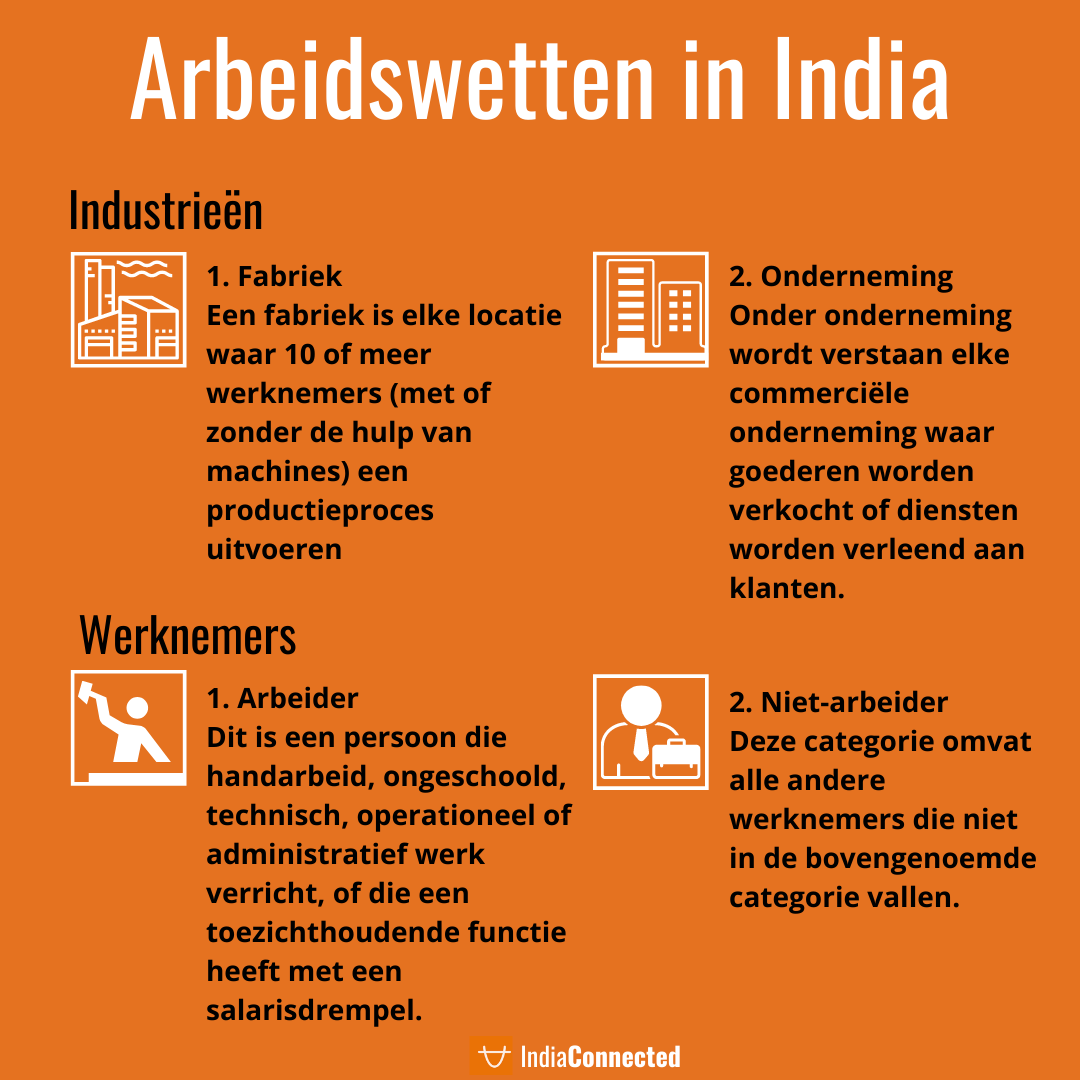Indian labour laws are constantly changing. If you employ staff in India or are considering hiring staff in India, it is important to be well-informed about the latest developments in this field. We would like to give you an insight into Indian labour law.
Indian labour law
In India, the federal and state governments both have the power to legislate in the area of employment and industrial relations. In many Indian states, a Shops and Establishments Act has been introduced, in which the local government has enacted its own specific laws or adjustments to the federal rules. National rules therefore apply differently in these states, which can sometimes make it difficult for foreign companies to be compliant.
A unique feature of Indian law is that there are different rules for different categories of industries and workers. Indian labour laws divide "industry" into two broad categories, namely factories (production units) and enterprises (non-production units). Workers are also divided into two broad categories: manual and non-manual, with manual worker defined as a person who performs manual, unskilled, skilled, technical, operational or administrative work.
The applicability of the various laws and the protection provided may therefore vary from case to case. Employers must also take into account the number of employees they employ in India as many laws apply based on the number of employees working for a company. Laws regulating labour relations prescribe the minimum conditions of employment such as working hours, wages, entitlement to leave, notice and termination rights, health and safety standards, etc. Employers are obliged to provide workers with the minimum rights required by law. It is recommended to include all important employment conditions in the employment contract.
Labour documentation is customised in India
It is crucial for Dutch companies to have employment documentation that is suitable for the intended purpose. The tendency is often to opt for consistency. Therefore, templates are usually copied that have already been used in other countries. This can put companies at risk of not fully complying with Indian law. A thorough review of contractual labour documentation, including company policies and manuals by an Indian lawyer is highly recommended to comply with Indian labour laws.
The four labour laws of 2021
Since 2014, the Indian government has been trying to bring more structure to India's labor regulations by reducing the 44 federal laws to four overarching codes. After years of opposition by opposition parties, four new codes were nevertheless introduced in mid-2022: The Code of Wages, The Industrial Relations Code, The Social Security Code and The Code on Occupational Safety, Health and Working Conditions. The purpose of the codes is to simplify the country's outdated labor laws and boost economic activity without compromising workers' rights.
1. The Code of Wages
The Code of Wages, as the name suggests, focuses on wages. At present, the Indian states still determine the minimum wages, which means that for the same job, different minimum wages apply per state. The Wage Code solves this problem by establishing a 'minimum wage' requirement. In addition, the Wage Code stipulates that men, women and other gender identities should receive the same remuneration for the same position or a similar amount of work.
2. The Industrial Relations Code
This code makes it easier for companies to hire and fire employees. Previously, companies with more than 100 employees had to request permission from the state government where the company was located in order to hire and fire employees. In addition, companies with less than 300 employees no longer need to have a so-called standing order. These are the detailed rules of conduct for workers working in industrial establishments, such as on entering and leaving the premises, working hours, wages, shift schedules, leave and attendance, provisions on misconduct, etc.
3. The Social Security Code
With this code, the Indian government is expanding the social security system and responding to the rapid development of the gig economy. The SS Code introduces some important new concepts such as "Aggregator" which is defined as a digital intermediary or a marketplace, where a buyer or user of a service interacts with the seller or service provider.
4. The Code on Occupational Safety, Health and Working Conditions
This code incorporates and consolidates several important pieces of legislation on working conditions for employees into one comprehensive law. The OSH Code outlines the obligations of every employer in relation to its employees and the workplace. According to the OSH Code, the employer must provide welfare activities for the employees in addition to work.
Protection of women
The prevention of sexual harassment in India must be a part of the occupational health and safety policy adopted in companies, which includes preventive and, if necessary, punitive measures. The Sexual Harassment of Women at Workplace (Prevention, Prohibition and Redressal) Act, 2013 ("Act 2013") provides necessary guidance in dealing with such issues. Under this Act, employers are required to establish an independent grievance committee in the case of a complaint at every office or branch of an organisation with ten or more employees. If an employer fails to set up an internal complaints committee or violates the law, it can be fined INR 50,000, roughly EUR 600. A repetition of the offence may be punished by doubling the fine, writing off the entity or cancelling the entity's legal business licences.
In addition, most federal laws restrict women from working at night for safety reasons. If women wish to work at night, specific approval must be obtained from the relevant government authority. The employer must also provide door-to-door transportation and meet a number of safety-related requirements.
Privacy and data protection in India
The concept of privacy and data protection is at a nascent stage in India, especially when compared to the plethora of regulations and legislation in Western countries. In India, the Information Technology Act 2000 requires companies holding sensitive personal data or information to implement and maintain reasonable security practices and procedures. The explicit consent of employees, whose data is collected, stored or transferred, must also be obtained in accordance with applicable rules.
How do you set up a sound health and safety policy for your Indian branch?
India is heavily regulated because its labour laws focus on protecting the worker. It is therefore wise to seek legal advice before drawing up employment contracts and conditions. It is also advisable to seek practical advice on best practices so that the labour policy in your Indian office is not only legally compliant but also HR-friendly. Many foreign companies struggle with high staff turnover in India, which can be easily avoided by offering appropriate salaries and benefits in line with Indian regulations.
Are you unsure about your policies or whether you are complying with Indian regulations? Our local legal and HR specialists are always up to date with the latest developments and are happy to help you find the right solutions to your specific problem.


